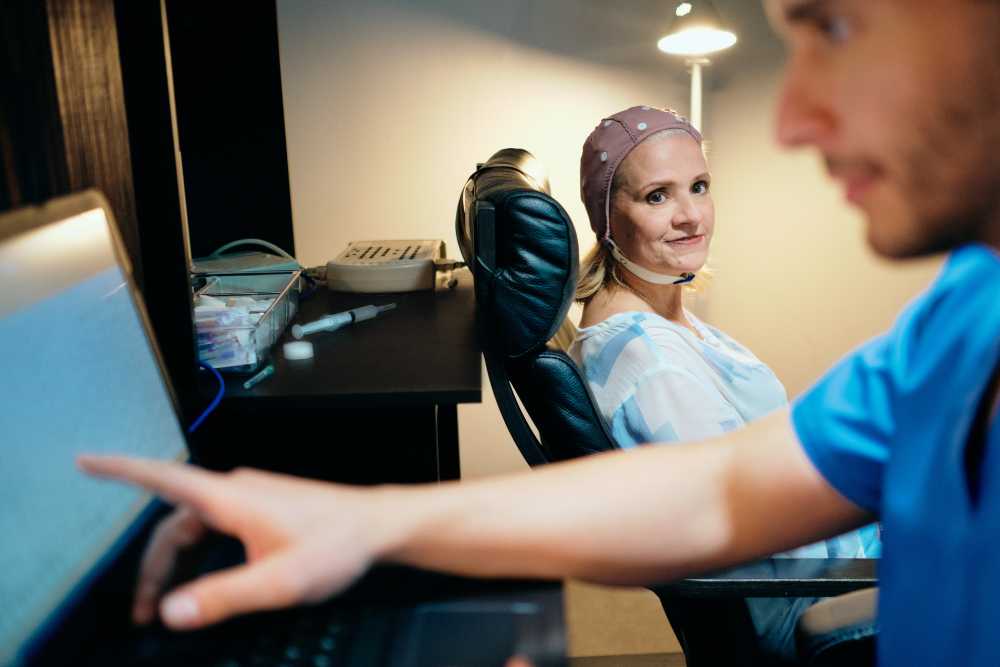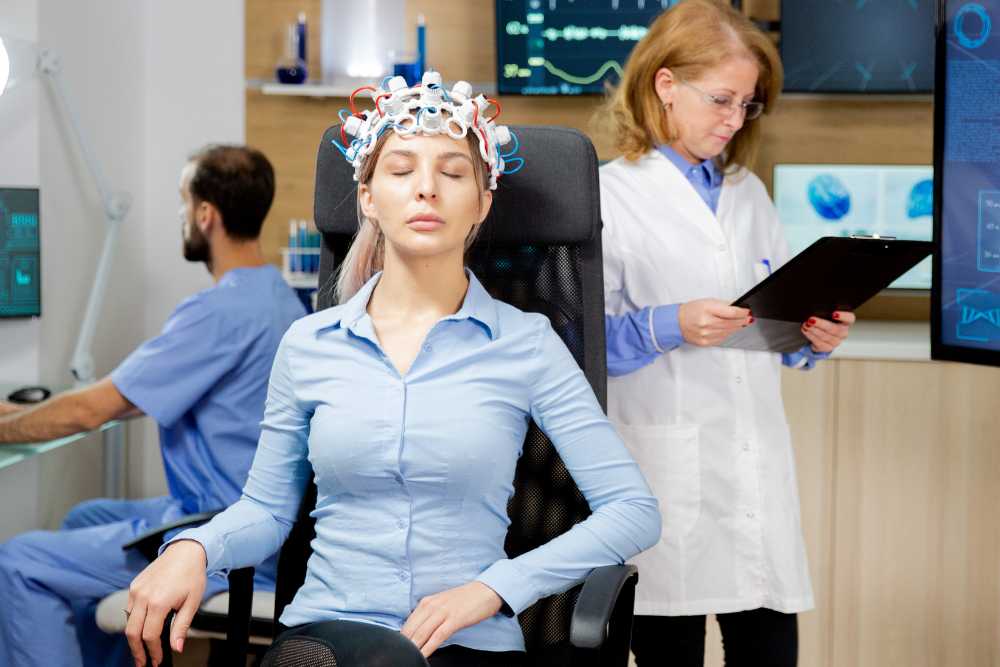When looking at the pros and cons of TMS therapy (Transcranial Magnetic Stimulation), there are several compelling considerations for individuals struggling with treatment-resistant depression and other mental health conditions. One of its most significant benefits for TMS and mental health disorder treatment is that it’s a non-invasive procedure that doesn’t require anesthesia or sedation, allowing patients to resume normal activities immediately after each session. Unlike antidepressant medications, TMS produces minimal systemic side effects since it targets specific brain regions rather than affecting the entire body through the bloodstream.
On the downside, TMS therapy has notable limitations that patients should consider. The treatment requires a significant time commitment, typically involving daily sessions five days a week for four to six weeks, which can be challenging for people with busy schedules or limited access to treatment centers.
While insurance coverage for TMS therapy has improved, it’s not universally available and often requires documentation of failed medication trials. Some patients experience uncomfortable side effects during treatment, including scalp discomfort, headaches, or facial twitching, and there’s a small risk of seizures, particularly in individuals with predisposing factors.
The bottom line is that TMS isn’t effective for everyone, and the durability of its benefits varies, as some patients require maintenance sessions to sustain improvement. It’s best to discuss the treatment with a mental health provider to determine if it’s the right therapy for your needs.

Is TMS Therapy Worth It for Treating Depression or Anxiety?
Whether TMS therapy is worth pursuing depends heavily on your individual circumstances, treatment history, and the severity of your condition. For people with treatment-resistant depression who haven’t responded adequately to multiple antidepressant medications, TMS can be genuinely life-changing and well worth the investment of time and money.
Clinical studies show that approximately 50-60% of patients with treatment-resistant depression experience significant improvement, and about one-third achieve complete remission of symptoms. If you’ve struggled through years of medication trials with limited success or intolerable side effects, TMS offers a fundamentally different approach that targets brain activity directly without the systemic effects of drugs.
Many patients find the absence of weight gain, sexual dysfunction, emotional blunting, and other common medication side effects to be invaluable, even if the treatment requires daily visits for several weeks. However, TMS may not be the best first-line option if you haven’t yet thoroughly explored traditional therapies.
For anxiety disorders specifically, the evidence base is less robust than for depression. While TMS shows promise for anxiety, it’s not yet FDA-approved for primary anxiety disorders, and research is still emerging. If the nearest TMS clinic is hours away, if you can’t commit to daily appointments for 4–6 weeks, or if the out-of-pocket costs would create financial hardship, the treatment may not be feasible, regardless of its potential benefits.
What Are the Advantages of Choosing TMS Therapy Over Medication?
The benefits of TMS therapy for mental health make it an attractive alternative for many individuals who struggle with depression, particularly those who haven’t found success with traditional pharmaceutical approaches.
- Non-invasive with minimal systemic side effects: Unlike medications that circulate throughout your entire body and can affect multiple organ systems, TMS uses targeted magnetic pulses to stimulate specific brain regions involved in mood regulation.
- No chemical dependency or withdrawal concerns: TMS doesn’t introduce any substances into your body, which means there’s no risk of developing physical dependence or experiencing withdrawal symptoms if you stop treatment.
- Effective for treatment-resistant cases: If you’ve tried multiple antidepressants without adequate relief, TMS may succeed where medications have failed because it works through an entirely different mechanism.
- Preserved cognitive function and emotional range: Many people on antidepressants report feeling emotionally blunted or experiencing cognitive fog, memory issues, or difficulty concentrating.
- No drug interactions or contraindications with other medications: Because TMS isn’t a pharmaceutical intervention, it doesn’t interact with other medications you may be taking for depression, other mental health conditions, or physical health issues.
Mental Health Treatment That Works
Call 949-625-0564What our customers are saying
Why Do Many Patients Prefer TMS Over Antidepressants?
Many patients who have experienced both antidepressants and TMS therapy express a strong preference for TMS, primarily because it allows them to feel relief from depression without sacrificing other aspects of their well-being and daily functioning. The most commonly cited reason is the absence of the burdensome side effects that plague antidepressant use.
People often describe feeling like themselves again with TMS in a way they never did on medication, where even when antidepressants worked, they sometimes created an emotional flatness or disconnection that felt almost as troubling as the depression itself. The ability to drive themselves to and from treatment, continue working or attending school on the same day, and maintain mental clarity throughout the process gives patients a sense of control and normalcy.
Patients who’ve struggled with the frustrating trial-and-error process of finding the proper medication, waiting weeks or months to see if each new drug works while enduring its unique side effects, often find TMS refreshingly straightforward by comparison. The treatment either works or it doesn’t within a predictable timeframe, and there’s no need to worry about running out of prescriptions, managing refills, or dealing with pharmacy issues.
How Long Do the Results of TMS Therapy Last?
The durability of TMS therapy results varies significantly from person to person, but understanding the typical timelines and factors that influence lasting benefits can help set realistic expectations for this treatment.
- Initial response timeline: Most patients don’t experience immediate results from TMS therapy, as the benefits tend to build gradually over the course of treatment.
- Average duration of benefits: Research indicates that, among patients who respond positively to TMS, benefits commonly last from six months to over one year after completing the initial treatment course.
- Factors affecting longevity: The duration of TMS benefits can be influenced by several variables, including the severity of your initial depression.
- Maintenance treatment options: When symptoms return, many patients don’t need to start over with a full course of treatment.
- Re-treatment success rates: If depression symptoms do fully return after a period of wellness, TMS can generally be repeated with good success rates.

Key Takeaways on the Pros and Cons of TMS Therapy
- Unlike antidepressants that affect your entire body, TMS uses magnetic pulses to stimulate specific brain regions associated with depression.
- The therapy shows the most promise for individuals who haven’t responded adequately to multiple antidepressant trials.
- MS involves daily sessions five days a week for four to six weeks, totaling 20–30 treatments.
- Unlike some medications that may work quickly, TMS benefits emerge gradually over the course of treatment.
- The therapy represents the best value for individuals with moderate to severe treatment-resistant depression who can manage the time commitment and costs.
Consider examining the pros and cons of TMS therapy to determine if it aligns with your personal health needs. If you’re in Southern California and seeking effective outpatient treatment options, don’t hesitate to reach out to Moment of Clarity at 949-625-0564. Our team is dedicated to providing comprehensive care tailored to help you on your journey to better mental health.
Resources
- Harvard Medical School – Transcranial magnetic stimulation (TMS): Hope for stubborn depression
- National Library of Medicine – Repetitive Transcranial Magnetic Stimulation
- National Library of Medicine – Utilization and outcomes of transcranial magnetic stimulation and usual care for MDD in a large group psychiatric practice




